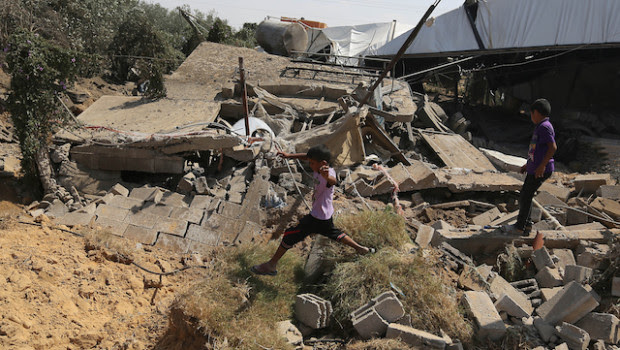BLOGS
Blogs
"the surge in extreme nationalism made Israel look a lot more like a fascist state than the Middle East’s 'only democracy'”
August 7, 2014
In Blog
“”

Published on August 6th, 2014 | by Mitchell Plitnick
Ceasefire in Gaza: Where Things Stand
by Mitchell Plitnick
With a 72-hour truce apparently holding in Gaza and Israel having ended its ground operation, now seems like a fair time to assess where things stand. Has anyone emerged from this war in a better position? Is there anything that can, at least in a cynical and Machiavellian sense, be called a victory?
Palestine
It goes without saying that the overwhelming majority of the physical destruction was borne by the people of Gaza. At this point, the numbers are just horrifyingly grim: 1,968 dead — 1,626 of whom were civilians — and 7,920 wounded. While we don’t have a precise percentage, we do know that there are at least 2,111 children and 1,415 women among the wounded.
The already mangled sole power plant in Gaza was damaged even further, leaving most of the strip without electricity. The United Nations Development Program estimates between 16 and 18,000 homes were severely damaged or destroyed and over half a million Gazans (out of a population of roughly 1.8 million) have been internally displaced.
As one report put it, “…almost every piece of critical infrastructure, from electricity to water to sewage, has been seriously compromised by either direct hits from Israeli air strikes and shelling or collateral damage.”
This is clearly the worst hit Gaza has taken, demonstrably more severe than Operation Cast Lead (2008-09). Even so, there seems to be no appetite there for a return to the status quo ante from the mass media, social media or my own interactions; the call for an end to the seven-year Israeli blockade of Gaza as part of a lasting ceasefire persists.
Concomitantly, Hamas, though still facing the same problems as before (an inability to pay civil employees, increasing isolation in the region due to the decline of the Muslim Brotherhood and little leverage of their own to address Gaza’s economic woes) has been strengthened politically by Israel’s onslaught.
Once again, Hamas survived without conceding, and that grants them a considerable boost. It won’t last forever, of course, but they have re-established themselves as the leaders in confronting Israel. The unity agreement between Hamas and Fatah has also apparently survived the fighting, though in practice the destruction of Gaza’s infrastructure makes implementation there much more difficult. Palestinian unity was the primary reason that Israeli Prime Minister Benjamin Netanyahu lied to the Israeli public about the fates of the three murdered Israelis in June — the event that sparked the spiral into this violence. That, too, can be counted as a victory.
The relationship between the Palestinian Authority and Hamas is very unclear. It seemed strained in June, as Israel swept through the West Bank under the pretext of looking for the three youths who they knew were already dead. Palestinian President Mahmoud Abbas continued his security cooperation with Israel during this time and even prevented demonstrations against Israel’s actions after the fighting started in Gaza.
But as the fighting wore on, Abbas, who at first supported Egypt’s ceasefire proposal that Hamas could not accept, began supporting Hamas’ demands to end the fighting. By the end, Abbas was accusing Israel of war crimes, threatening to sign the Rome Statute and thereby bringing Israel to the International Criminal Court, and calling for the blockade of Gaza to be lifted. Officially, the PA has not broken the unity agreement — another major victory for Hamas.
Yet Hamas could not have missed the signals of this round. They managed to increase global awareness of the blockade, but found themselves being pressured by the Arab League. Turkey and Qatar remain Hamas’ only allies, but they proved largely ineffectual against the United States, Egypt, and the Saudis (despite the Saudi rhetoric, which was varied and clearly unsympathetic to Hamas but sympathetic to Gazan civilians).
At this point, efforts again appear geared at getting the PA back into the business of controlling Gaza’s borders. For Hamas, that will be a mixed blessing. If it happens with the unity agreement intact, then Hamas will have won itself a clear place in the Palestinian political system, and Israel will have to accept it if they let the PA administer the border crossings. Israel won’t like that at all, but the US, Egypt and the Saudis may push hard for such an arrangement in the interest of stability. This would also be a step toward ending Hamas’ control over the strip, to the extent that there is anything that can legitimately be called Palestinian control in Gaza.
Israel
The Israelis are not buying into Prime Minister Netanyahu’s claim of decisive victory in this operation, but they are overwhelmingly supportive of his decisions. In part, this reflects an appreciation of reality — Israel did a lot of damage in Gaza, but didn’t do itself a lot of good. The other part is that most Israelis believe that Netanyahu didn’t really want things to go this far.
Bibi whipped his country into a racist frenzy when those young men were kidnapped. Knowing Israeli sensibilities as he does, Bibi knew that their deaths would end the story, but a kidnapping would continue to enrage hard-line sectors of the Jewish populace. The idea was to drum up popular support for a series of actions against Hamas which, Netanyahu hoped, would shatter the Palestinian unity deal.
But Bibi’s right flank immediately started pressuring for escalation. Bibi didn’t want that, but once Hamas started fighting back in earnest, the political pressure for a broader operation was more than he could resist. The pressure continued, as did Hamas’ firepower, probably more than Bibi expected them to use. As matters escalated, Netanyahu had to keep re-defining the mission’s goals. First it was punishing Hamas for the murders, then it was a “quiet for quiet” arrangement — in other words a straight up ceasefire.
That idea was not met with public approval. By this time, Israelis were considerably frightened. Hamas’ rockets were penetrating much farther into Israel than ever before, and while the Iron Dome defense system limited the actual damage, it did not limit the spread of fear. So, the Israeli goals became diminishing Hamas’ rocket ability and eliminating what Israel called “terror tunnels.”
The tunnels are very frightening to Israelis and Israel appears to have eliminated them. But there are two big problems with this narrative. Firstly, destroying the tunnels was the main focus of the ground operation, but Egypt managed to destroy hundreds of them without a military attack; they simply flooded them from the Egyptian side. The second problem is that, while Israeli fears about the tunnels are understandble, it’s worth noting that Israel has known about them for quite a while and Hamas hadn’t used them until this round of fighting began.
So what, really, did Israel achieve? It caused Hamas to use about two-thirds of its rockets, but those can be replenished, and at the point of the ceasefire, Hamas and other factions were still firing at will. Israel destroyed Hamas’ tunnels, but they had been there for years and were posing only a potential threat. Israel meanwhile failed to destroy the unity agreement, at least for now.
These gains were bought by Israel at the price of Palestinian blood, and a higher domestic death toll than Israel is accustomed to (67, including three civilians). As much as it appears like Tel Aviv doesn’t care about that price, it is clear that Israel’s image took a major hit in this engagement. Formerly sympathetic media showed injured Gazan children and destroyed neighborhoods. Even the United States expressed concern about the disregard for civilian life and called the attack on a United Nations school that was housing refugees “disgraceful.” The UK is now reviewing all military sales to Israel, and Spain has suspended all military sales.
Those things should not be overstated. England and Spain are merely expressing their displeasure at Israel’s total disregard for civilian life in Gaza and will re-commence their sales to Israel in due course. Despite its occasional statements, the US has repeatedly defended Israel throughout this episode and is using the ceasefire to send more supplies to its ally.
Still, Israel has definitely come out of this appearing more villainous than Hamas. That’s going to make a difference going forward. Israel may no longer be able to bury the issue of the Gaza blockade, a form of collective punishment that has only helped solidify Hamas’ rule in Gaza and has deprived the people while failing to prevent the buildup of Hamas’ rockets. No one bought into the anti-Iran portion of Netanyahu’s rhetoric, another failure for Israel. Even in the US Jewish community, this onslaught shook a lot of pro-Israel faith and sent other Jews out of their living rooms and into the streets.
I see nothing but an illusion of victory here for the Israeli right. And for the rest of the country, the surge in extreme nationalism made Israel look a lot more like a fascist state than the Middle East’s “only democracy.”
The United States
There’s really little to say here. The US will look back at its actions in the Middle East in 2014 as one of the lowest periods in its diplomatic history. Secretary of State John Kerry failed to broker a ceasefire, and when he finally got one, it was broken within two hours. While both sides haddifferent stories about who really broke the ceasefire, the Israeli narrative dominated and allowed Netanyahu to tell the United States not to “second-guess him” about Hamas.
Leaks to Israeli media disparaged both President Barack Obama and Kerry. The US again showed the world that while it does have the power to pressure Israel, it is not going to use it, no matter how bloody Israel’s actions become or how many times it insults its American patron. The US meanwhile stands alone in defending Israel’s actions.
The Obama administration has occasionally had some good ideas about the Middle East, but has repeatedly shown it doesn’t have a clue about how to implement them. It paints itself as an advocate for peace, but shows no willingness to back up its words in the face of Israeli resistance. That’s why it’s more important now than ever for Europe or some other outside party to push its way past the US in dealing with this issue.
About the Author
Mitchell Plitnick is the former Director of the US Office of B’Tselem: The Israeli Information Center for Human Rights in the Occupied Territories, and was previously the Director of Education and Policy for Jewish Voice for Peace. He is a widely published and respected policy analyst. Born in New York City, raised an Orthodox Jew and educated in Yeshiva, Mitchell grew up in an extremist environment that passionately supported the radical Israeli settler movement. Plitnick regularly speaks all over the country on current issues. His writing has appeared in the Jordan Times, Israel Insider, UN Observer, Middle East Report, Global Dialogue, San Francisco Chronicle, Die Blaetter Fuer Deutsche Und Internationale Politik, Outlook, and in a regular column for a time in Tikkun Magazine. He has been interviewed by various outlets including PBS News Hour, the O’Reilly Factor and CNBC Asia. Plitnick graduated with honors from UC Berkeley in Middle Eastern Studies and wrote his thesis on Israeli and Jewish historiography.



